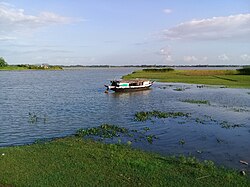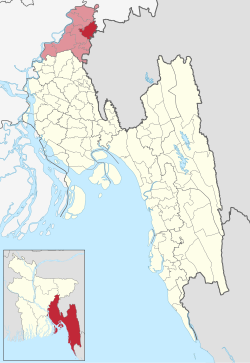Bijoynagar (Bengali: বিজয়নগর) is an upazila of Brahmanbaria District in the Division of Chittagong, Bangladesh.[3]
Bijoynagar
বিজয়নগর | |
|---|---|
 View of Hajipur village | |
 | |
| Coordinates: 24°1.3′N 91°16.8′E / 24.0217°N 91.2800°E | |
| Country | |
| Division | Chittagong |
| District | Brahmanbaria |
| Area | |
• Total | 221.17 km2 (85.39 sq mi) |
| Population | |
• Total | 290,431 |
| • Density | 1,300/km2 (3,400/sq mi) |
| Time zone | UTC+6 (BST) |
| Postal code | 3404[2] |
| Website | bijoynagar |
Geography
editBijoynagar has 48,617 households and a total area of 221.17 km2 (85 sq mi).
History
editPreviously it was a part of Tripura District. In 1618 CE during the reign of Jahangir, his commander in chief Daud Khan occupied this area from the king of Tripura. This locality was renamed as Daudpur Pargana after his name. After the struggle he (Daud Khan) settled here as administrative lord. This pargana was annexed with the pargana Jalalpur (Mymensingh). The British came into Bengal as Dewan (Revenue collector) in 1765 C.E. They created many districts for their administrative purposes. Again they established Tripura as District in 1790. Daudpur Pargana was also a part of Mymensingh. In 1860, the government established Brahmanbaria as sub-division. Daudpur, Sarail, Bejura and Haripur were separated from Mymensingh and submitted to Brahmanbaria. Ershad government promoted Brahmanbaria as Zilla in 1984 from sub-Division (Biplob, 16.4.2017).
Demographics
editAccording to the 2011 Census of Bangladesh, Bijoynagar Upazila had 48,617 households and a population of 257,247. 76,565 (29.76%) were under 10 years of age. Bijoynagar had a literacy rate (age 7 and over) of 53.41%, compared to the national average of 51.8%, and a sex ratio of 1048 females per 1000 males. 7,619 (2.96%) lived in urban areas.[5]
Administration
editBijoynagar Upazila is divided into ten union parishads: Bhudanty, Bishupor, Chandura, Char Islampur, Champaknagar, Harashpur, Ichhapur, Paharpur, Pattan, and Singerbil. The union parishads are subdivided into 164 mauzas and 225 villages.[5]
References
edit- ^ National Report (PDF). Population and Housing Census 2022. Vol. 1. Dhaka: Bangladesh Bureau of Statistics. November 2023. p. 396. ISBN 978-9844752016.
- ^ "Bangladesh Postal Code". Dhaka: Bangladesh Postal Department under the Department of Posts and Telecommunications of the Ministry of Posts, Telecommunications and Information Technology of the People's Republic of Bangladesh. 20 October 2024.
- ^ "Sheikh Hasina Road to open a new horizon in B'baria". The Asian Age. Retrieved 2019-02-25.
- ^ Population and Housing Census 2022 - District Report: Brahmanbaria (PDF). District Series. Dhaka: Bangladesh Bureau of Statistics. June 2024. ISBN 978-984-475-275-7.
- ^ Jump up to: a b "Bangladesh Population and Housing Census 2011 Zila Report – Brahmanbaria" (PDF). bbs.gov.bd. Bangladesh Bureau of Statistics.
